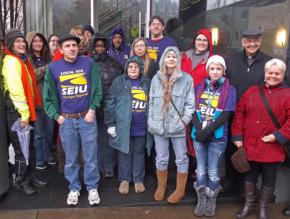We need a union at Bethesda
reports on a struggle for union representation in Portland, Ore.
A GROUP of workers from Bethesda Lutheran Communities (BLC) went to the company's office in downtown Portland, Ore., on March 6 to demand that BLC negotiate with employees who have been trying to organize with Service Employees International Union Local 503.
The group, who were led by two local church ministers, handed in a petition signed by BLC workers and community members. Among the demands is that BLC management respect workers’ decision to form a union, take a position of neutrality, allow workers to freely talk to co-workers about the union, provide workers with access to Bethesda work sites to discuss the issues, and agree to a fair process for forming a union free from management intimidation.
The workers, who are classified as direct support professionals (DSP), assist adults with developmental disabilities. Their duties include cooking, hygiene, cleaning, passing medication, interacting with clients, driving clients and trying to help the supported people integrate into mainstream society. Some clients are non-verbal or completely wheelchair-bound, or need diapers changed and feeding administered with tubes.

DSPs strive to give some meaning to the lives of developmentally disabled people, who are often isolated and discriminated against. Their lives have sometimes been filled with abuse and neglect, some living for decades in the notorious Oregon State Hospital. They live in group homes with 24-hour support. DSPs are trained in CPR and other lifesaving procedures.
Yet with all this responsibility, DSPs are rewarded with little more than the minimum wage. Starting pay is about $10 an hour, but wages go up very little from there. People who have been working with BLC for 13 years get $11.40 an hour. There is no holiday pay. Personal time off is accrued with each paycheck, but this includes vacation pay and sick time.
DSPs are required to work on all holidays, but there is no extra pay for this, not even on Christmas Day. And this is a Christian company that wants to spread the word of Jesus!
But the CEO of this nonprofit company doesn't have to worry, because he made $363,698 in 2010--or $174.85 per hour--along with 10 other BLC executives who are making six-figure salaries of over $168,000. And every year they appeal to workers to donate some of their meager wages.
A lot of the funding for the people we support comes from federal and state funds--in other words, taxpayers' money. So why is BLC spending thousands of this money on San Francisco lawyer and union-buster Maria Anastas?
Oregon Gov. John Kitzhaber wrote to BLC to point out that state and federal funds are intended to "provide safe and high-quality services to individuals with disabilities," and asked BLC to "insure that funds are focused exclusively on providing the safest, highest quality environments and services for clients."
VARIOUS DSPs from different homes got in contact with Local 503 only after BLC management told staff members that the union had gone to one of the homes frightening people (which wasn't true—the union hadn't gone to any home at that point). This brought together workers from the different homes, who hadn’t known each other before. Their stories were similar--understaffing, disrespect from management and chronic low wages.
Since the workers started organizing, management has sent out a number of e-mails and notices alleging that union supporters were intimidating and frightening other workers, but it's management who is frightening workers with horror stories about the union. The latest e-mail sent out the day before the protest insinuated that the union had called for a "walkout" and started quoting labor law.
BLC operates in a number of states, so successful organizing in Portland could be a springboard to organizing in other states. That is likely why the company is putting so much effort and money into stopping workers in Portland.
But the workers haven't been intimidated. A number of DSPs have put their photos on union flyers and a statement of why they are supporting a voice in the workplace. We're not going to be bullied. For far too long, management has had its way, taking disciplinary action against employees with no representation.
Management has repeatedly said that "we" don't need a "third party." Well, we have a message for management: the union is us organizing.
We care a great deal about the people we support, but the most disruptive thing in their lives is the constant turnover and shortages of staff. We need stability for the people so our clients can have the best possible lives. We need good funding from the state and good pay and conditions to provide the best possible service to the people we support--and we can and will fight for both.
The working conditions of the DSPs are the living conditions of the people we support. We will fight for both.


